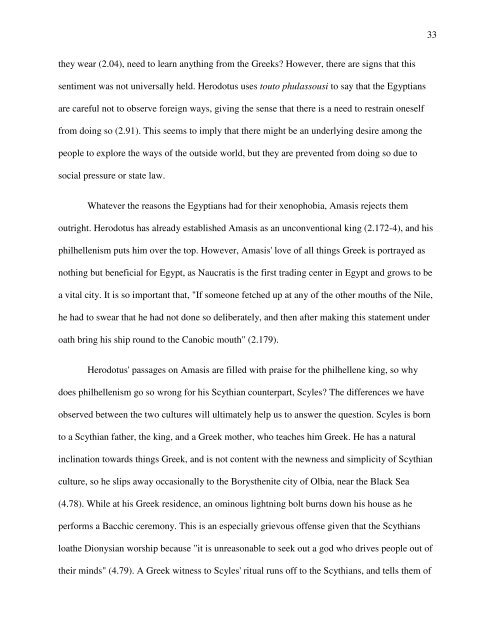The Old and the Restless - The Egyptians and the Scythians in Herodotus' Histories by Robert J. Hagan
You also want an ePaper? Increase the reach of your titles
YUMPU automatically turns print PDFs into web optimized ePapers that Google loves.
33<br />
<strong>the</strong>y wear (2.04), need to learn anyth<strong>in</strong>g from <strong>the</strong> Greeks? However, <strong>the</strong>re are signs that this<br />
sentiment was not universally held. Herodotus uses touto phulassousi to say that <strong>the</strong> <strong>Egyptians</strong><br />
are careful not to observe foreign ways, giv<strong>in</strong>g <strong>the</strong> sense that <strong>the</strong>re is a need to restra<strong>in</strong> oneself<br />
from do<strong>in</strong>g so (2.91). This seems to imply that <strong>the</strong>re might be an underly<strong>in</strong>g desire among <strong>the</strong><br />
people to explore <strong>the</strong> ways of <strong>the</strong> outside world, but <strong>the</strong>y are prevented from do<strong>in</strong>g so due to<br />
social pressure or state law.<br />
Whatever <strong>the</strong> reasons <strong>the</strong> <strong>Egyptians</strong> had for <strong>the</strong>ir xenophobia, Amasis rejects <strong>the</strong>m<br />
outright. Herodotus has already established Amasis as an unconventional k<strong>in</strong>g (2.172-4), <strong>and</strong> his<br />
philhellenism puts him over <strong>the</strong> top. However, Amasis' love of all th<strong>in</strong>gs Greek is portrayed as<br />
noth<strong>in</strong>g but beneficial for Egypt, as Naucratis is <strong>the</strong> first trad<strong>in</strong>g center <strong>in</strong> Egypt <strong>and</strong> grows to be<br />
a vital city. It is so important that, "If someone fetched up at any of <strong>the</strong> o<strong>the</strong>r mouths of <strong>the</strong> Nile,<br />
he had to swear that he had not done so deliberately, <strong>and</strong> <strong>the</strong>n after mak<strong>in</strong>g this statement under<br />
oath br<strong>in</strong>g his ship round to <strong>the</strong> Canobic mouth" (2.179).<br />
<strong>Herodotus'</strong> passages on Amasis are filled with praise for <strong>the</strong> philhellene k<strong>in</strong>g, so why<br />
does philhellenism go so wrong for his Scythian counterpart, Scyles? <strong>The</strong> differences we have<br />
observed between <strong>the</strong> two cultures will ultimately help us to answer <strong>the</strong> question. Scyles is born<br />
to a Scythian fa<strong>the</strong>r, <strong>the</strong> k<strong>in</strong>g, <strong>and</strong> a Greek mo<strong>the</strong>r, who teaches him Greek. He has a natural<br />
<strong>in</strong>cl<strong>in</strong>ation towards th<strong>in</strong>gs Greek, <strong>and</strong> is not content with <strong>the</strong> newness <strong>and</strong> simplicity of Scythian<br />
culture, so he slips away occasionally to <strong>the</strong> Borys<strong>the</strong>nite city of Olbia, near <strong>the</strong> Black Sea<br />
(4.78). While at his Greek residence, an om<strong>in</strong>ous lightn<strong>in</strong>g bolt burns down his house as he<br />
performs a Bacchic ceremony. This is an especially grievous offense given that <strong>the</strong> <strong>Scythians</strong><br />
loa<strong>the</strong> Dionysian worship because "it is unreasonable to seek out a god who drives people out of<br />
<strong>the</strong>ir m<strong>in</strong>ds" (4.79). A Greek witness to Scyles' ritual runs off to <strong>the</strong> <strong>Scythians</strong>, <strong>and</strong> tells <strong>the</strong>m of
















